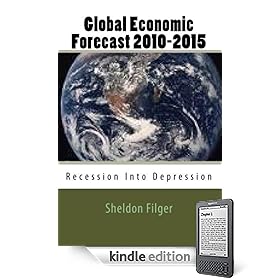China’s Economy Is Contracting In The Industrial Sector
The figures for China’s purchasing managers’ index (PMI) for November registered a mere 49 points, according to the China Federation of Logistics and Purchasing. This figure represents a contraction in the crucial Chinese manufacturing sector. It has been due to its role as factory to the world that China’s GDP has been propelled to the second largest in the world. The latest PMI has been amplified by a similar index compiled by HSBC, which is also reporting a contraction in the industrial sector. This dismal news on the supposedly rapidly growing Chinese economy is being attributed to a decrease in exports to the Eurozone countries, now mired in an ever-worsening sovereign debt crisis. The data on China’s PMI is the worst since February 2009, at the tail-end of the free fall contraction in the global economy after the onset of the global economic crisis in the fall of 2008.
How worried should one be about the industrial contraction in China? Many observers have already pointed out that China’s rapid growth at a time of economic decline and stagnation among advanced economies was in large part artificially induced by massive government spending, in particular on uninhabited apartment complexes and unoccupied shopping malls. But more importantly, how worried is China about the economic health of its largest customers, in both the Euozone/UK region and the United States? This is what Chinese Vice Finance Minister Zhu Guangyao said about the current global economic crisis: “The current global crisis may be in some way more severe and challenging than that of 2008 after the collapse of Lehman Brothers.”
The Chinese political leadership is clearly worried about the spillover effects of the Eurozone debt crisis on China. This has led to some radical about-turns in economic policymaking. Concerns about inflation and banks with a significant portfolio of bad loans have been discarded. The authorities in Beijing are again focused on growth at all costs, involving the loosening of monetary policies and requirements on Chinese banks for minimal provision for reserves against bad loans. However, with a much smaller proportion of its economy driven by domestic consumption compared to the Eurozone, U.K. and U.S., there is only so much the government can do to induce growth at a time of stagnation or contraction of its exports to its largest customers. In the final analysis, China cannot go on indefinitely building uninhabited cities as a means of creating “growth” in its GDP.
Despite all the talk in economic circles about the large economies in East Asia being “decoupled” from the advanced economies in Europe and North America, China is as much a prisoner of the impact of the Eurozone debt crisis as is America-just as Europe and China were prisoners of the subprime mortgage meltdown in the United States. In our integrated global economy, no one is immune to the effects of a legacy of bad economic and fiscal policymaking in Washington and Brussels, least of all Beijing.



